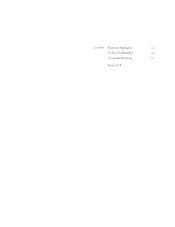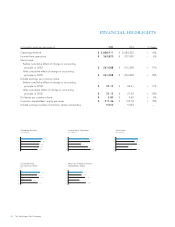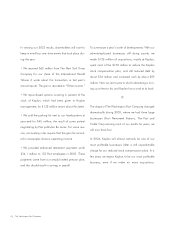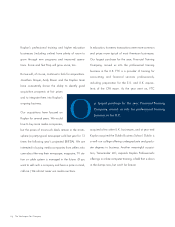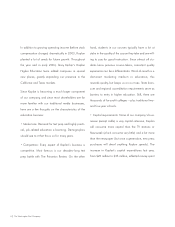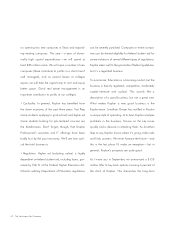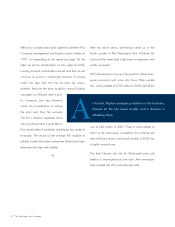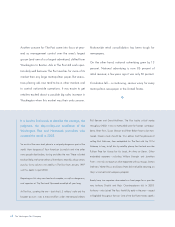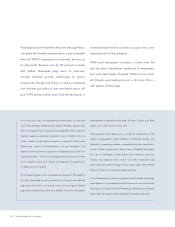Washington Post 2003 Annual Report Download - page 11
Download and view the complete annual report
Please find page 11 of the 2003 Washington Post annual report below. You can navigate through the pages in the report by either clicking on the pages listed below, or by using the keyword search tool below to find specific information within the annual report.
Washingtonpost.Newsweek Interactive set tough finan-
cial goals that made everyone nervous and surpassed
them all. WPNI’s operating loss continued, but was cut
by about half. Revenue rose by 30 percent to nearly
$47 million. Newsweek page views, in particular,
showed dramatic growth. Advertising on search
engines like Google and Yahoo, as well as competing
with Monster and others in the recruitment sector, will
give WPNI plenty to think about. But the year gave us
increased hope that this business can grow into a very
important part of the company.
While paid newspaper circulation is down over the
past ten years everywhere, readership of newspapers
has never been higher if Internet “editions” are includ-
ed (though washingtonpost.com is far more than a
web edition of the paper).
09 The Washington Post Company
ers in the press corps, he reported and wrote stories no one else
could. (For example, Shadid and our brilliant Pentagon reporter Tom
Ricks accompanied a U.S. patrol through Baghdad. Ricks noted the
friendly, supportive comments directed to them in English from the
crowd. Shadid, as the soldiers moved on, recorded hostile, even
threatening, voices.) Chandrasekaran, moving throughout the
region as the war went on, became our Baghdad bureau chief dur-
ing the year. Rajiv’s 140-plus front-page bylines must have set some
kind of modern record for a foreign correspondent; his quality was
as impressive as his output.
All the reporting jobs at this newspaper are important. The depth of
the staffs assembled by executive editor Len Downie and editorial
page editor Fred Hiatt is our greatest ever. Last year deputy editorial
page editor Colbert King, movie critic Stephen Hunter and the foreign
correspondent husband-and-wife team of Kevin Sullivan and Mary
Jordan won Pulitzer Prizes for their work.
Newsweek, too, had a great year in journalism. It seemed to us that
veteran correspondents Rod Nordland, Christopher Dickey and
Melinda Liu, among many others, consistently beat their competition.
Liu was another reporter who chose to stay in Baghdad throughout
the war. In Washington, writers/editors Dan Klaidman and Evan
Thomas and reporters Mike Isikoff and Mark Hosenball kept
Newsweek miles ahead and got the big stories right; editor Fareed
Zakaria’s columns on Iraq were read everywhere.
It’s on Newsweek’s journalistic performance that the health of the mag-
azine depends. Our competitor has all the resources of a vast publish-
ing empire, but editors like Mark Whitaker, Jon Meacham and Dorothy
Kalins make Newsweek a great magazine for readers every week.


